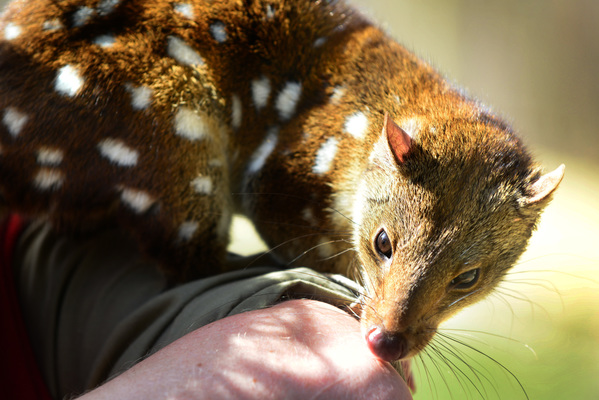
By Derek Schlennstedt
Locals and visitors in the Kinglake and Toolangi areas are being urged by Parks Victoria to keep a keen eye out for the threatened Spotted-Tailed Quoll.
Also known as a Tiger Quoll, the Spotted-Tailed Quoll is mainland Australia’s largest carnivorous marsupial and is extremely rare across Victoria.
Parks Victoria Ranger Tony Fitzgerald said that there was evidence that quolls could inhabit the forests of Kinglake and Toolangi and that prior to Black Saturday they were ‘“very close” to finding one.
“Anecdotally we know that the Spotted-Tailed Quoll is in the Kinglake area but we haven’t had a reputable confirmed sighting in the area since the 1980s,” Mr Fitzgerald said.
“Parks Victoria staff were very close to confirming a sighting in the Kinglake National Park in the months prior to the Black Saturday bushfires.”
There had been very reliable signs: likely quoll scat had been tested and the date for the ‘quoll party’ was almost set, but then the fire destroyed all the evidence. So we are still very keen to try and find proof of quolls being in the area.”
The threatened species is about the size of a domestic cat when fully grown, but has shorter legs and a more pointed face than a cat.
Its fur is rich red to dark brown and as its name implies, it is covered with white spots on the back that continue down its tail.
Quolls can also be identified by their distinctive call that people can listen out for – a bit like a circular saw cutting through timber, Mr Fitzgerald said.
That distinctive sound is mainly heard at night and people are more likely to hear the animal than see it.
Though, spring offers the perfect opportunity to identify quolls as they will be caring for their young.
“At this time of year, quolls may be easier to spot because they will be caring for their young and not venturing as far from their den … this is a great time to let us know if you think you see or hear a quoll as we are more likely to be able to locate them to confirm the sighting,” he said.
If you hear or see anything you think may be a quoll, please contact Tony Fitzgerald at Parks Victoria on 13 19 63.






